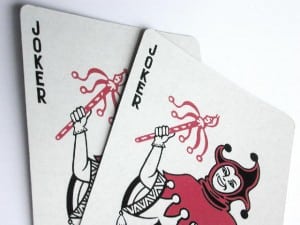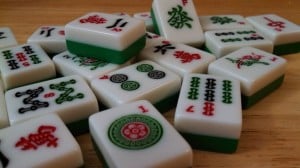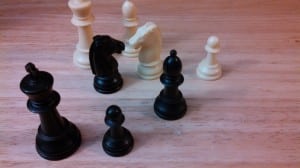Games are a recurring theme in Firehurler. I used them for a number of purposes. First of all, it is a normal part of people’s lives. Not all leisure time is outdoorsy or debauched. There isn’t a festival, a court ball or a a dinner party every night, and even if there were, what of the rest of the day? Most people have time in their lives that need filling, amusements to find. Games are one of the many ways people fill that time, pairing it with the need for competition, diversion, or a bit of extra coin on the side.
Another reason for games is that they provide an alternate setting, even if the location is one that is used elsewhere. Sitting around a table and drinking is quite a different environment when those same characters have a card game going on. The conversation shifts from drunken bravado to measured probing for information, a jovial atmosphere gains an edge of tension, and casual camaraderie is replaced with taking measure of the other players.
Somewhat related to the change of setting is the opportunity to reveal other traits, ones not normally seen in a night’s carousing. Before we ever see Denrik’s new crew in action, we watch them as they play Crackle. Rashan tests Iridan’s recovering wits with a game of chess, and in turn is bested by Brannis, the first thing that gains Brannis some measure of respect and becomes the foundation of the opinion Rashan forms of him.
I will save detailed discussions of rules for another time, but I’d like to share a few of the games that I used in Firehurler and how I conceived of them.
Crackle (and Talis)
I wanted a card game that would be suitable for a meeting of pirates. It would be a simple game, at least in terms rules, but take a heart of steel and nerves like a headsman to play well. Of course, who would make cards for a game like that? Surely someone might, but making cheap paper cards for ruffians isn’t exactly a promising business model. It might seem like a trivial consideration, but this is the sort of thing I worry about when adding an element like this into the story. What I came up with was a second game, an upper-class game, which would have a reason for the cards to exist. I called the game Talis – an intellectual, strategic game – and Crackle players would use the Talis cards for their game.
The feel of Crackle mattered more than the particulars. I wanted an adversarial game, something that cutthroats could dig their teeth into and take pride in. There’s a lot of poker in Crackle for that reason. Going back to Old West times, it was a game popular among outlaws. The betting, the bluffing, the taking measure of your opponent, poker had the same basics I was looking for, so Crackle is a variant on the game.
Avarice
That’s the Megrenn name for the game Jinzan and his goblin allies played. The goblin’s name for it translates to “swineherd making fences”. I wanted this to be a fast-paced game, something the goblins were good at and which would let Jinzan worry about them conspiring against them. I drew elements from a few games to create it.
The idea of the one-sided tiles is common to both dominoes and mahjong. The linking up matching tiles was another based on dominoes. The concept of variable scoring based on quality of completion was another from mahjong. The idea of a “hand” of tiles, with drawing and discarding, is a play on rummy. The idea of scoring based on an enclosed was an idea I got from Go, but the implementation is far different.
That the tiles are square, with a symbol per side to match, was the unique element I build in after conceptualizing it on familiar games. The disagreement over whether tiles should be discarded faceup or facedown was inserted to highlight the cultural differences and also to distance Jinzan from his hosts; it was another 3:1 conflict, with him on the losing end.
Chess
I have a confession to make: I did not invent chess.
There, I said it. Now that I’ve cleared up that issue, I can explain why I used it, as is, in Firehurler. You see, in the Twinborn universe, I view chess as the universal game. It’s simple enough for the concept to easily pass through dreams and emerge unscathed, unaltered, and completely relevant. Even if pieces were to change names or appearances, the game could pass unaltered from a primitive world to a more advanced one or vice versa.
I did four things with chess (I always like it when I get multiple uses out of something). First, I used it as a proxy for a battle of wits; that’s straightforward enough, since that’s the most common use for it on Earth as well. Second, I highlighted the differences in philosophy between the knights and sorcerers. The knights taught to defend and stalemate, the sorcerers to win at all costs. Third, I used it to hint at the connections between Tellurak and Veydrus. Kyrus’s copying of Lord Kendelaine’s treatise on the game and his subsequent matches with Davin made Brannis a better player in Kadrin – he had learned both the knightly, sorcerous, and Acardian ways of playing. Lastly, I used it as an analogy for the Brannis’s promotion through the ranks of the Kadrin Army; he began as a pawn and advanced to the back rank, becoming something more.
How to spot a twinborn: They want to play chess with you, but they have a style unlike any you’ve ever seen before.




0 Comments